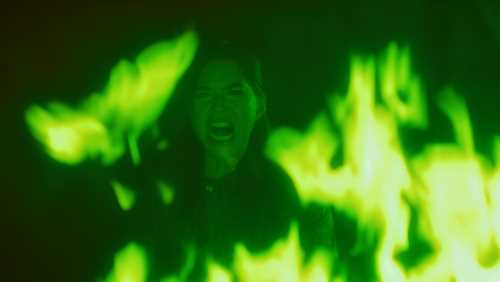
It’s time for a new kind of superhero.
In “Evil Fire” (“Macîskotêw”) – an upcoming thriller presented at Frontières’ Forum – Kîsik gains the power to set things on fire with her mind after seeing a mysterious green light in the sky.
Seeking information on her mother and other missing Indigenous women, she uncovers a disturbing conspiracy with her new girlfriend Jackie.
Anne-Marie Gélinas and Sera-Lys McArthur produce for EMAfilms, behind 2015’s “Turbo Kid,” the breakout Sundance hit of Canadian cult trio RKSS, and Fanning Feathers.
“I hope now is the right time for this film,” says director Theo Jean Cuthand. “Macîskotêw” is set to shoot in the late spring 2024.
“The issue of missing and murdered women, girls and two-spirits has been building for years. The fact that we are still fighting with the government to even search for the bodies means that people need to listen. People need to care.”
“Growing up as an Indigenous woman in Canada can be compared to a horror movie at times. You are afraid and concerned for your safety. It’s a real fear that affects us,” says McArthur, with Gélinas adding:
“If we, white women, go out at night, our alarms go off. But it’s not everywhere and it’s not all the time, and that’s what this project talks about. When you are an Indigenous woman, the danger is all around.”
While the film won’t be visual effects-heavy, the way in which Kîsik gains her superpower is crucial.
“We are using actual Indigenous folklore to tether us into these supernatural elements. From a cultural perspective it’s really important,” observes McArthur.
“I grew up in Saskatoon which is just north enough to see the northern lights. I have also seen things in the sky that don’t have logical explanations. I’m aiming to recreate that sense of awe,” adds Cuthand, who already played with similar effects in short “Kwêskosîw” (“She Whistles”).
“I’m hoping people will feel empowered by the story in the same way Kisîk is empowered by her supernatural abilities.”
Cuthand, an Indigenous queer trans man himself, wanted to create a “loveable, flawed” protagonist.
“She is an Indigenous lesbian superhero, but I feel many can connect with her, regardless of their gender, race or sexual orientation,” he says.

“Kîsik and Jackie are dealing with extremely difficult circumstances, yet still loving each other and willing to do the work to stay together. It’s important to show their relationship so that people are reminded that Indigenous women are loved.”
Despite tackling difficult subjects, the team is committed to making an entertaining film, they say.
“I really want this message out there, but we are not just hammering it in. What I love about this is that it’s a thriller, so if you want to just watch a thriller, you can,” notes Gélinas.
Cuthand adds: “Being transported into a gripping story while also learning about the issues facing Indigenous women, girls and two-spirits is more fun than watching documentaries. Docs are great, don’t get me wrong, but having an escapist fantasy is really exciting for audiences.”
While there is more awareness and attention towards socially conscious storytelling these days, says McArthur, “Macîskotêw” won’t be another niche offering.
“We are going for a wide audience,” she says.
“[As Indigenous filmmakers] we are still underfunded, which often limits the quality of the product we can put out. But the perspective this story is coming from is unique and new. People haven’t seen it before.”
Still, any film about Indigenous people becomes political, argues Cuthand.
“We are the original caretakers of this land and it’s one of the things which makes us targets for violence,” he says.
“Right now, in Canada, people are fighting for the police to search a landfill in Winnipeg for Indigenous women’s bodies, and the police and government refuse, even though a similar search was carried out in Toronto for a white man.”
“This kind of careless attitude is something that fuels why we are making this film.”
Read More About:
Source: Read Full Article